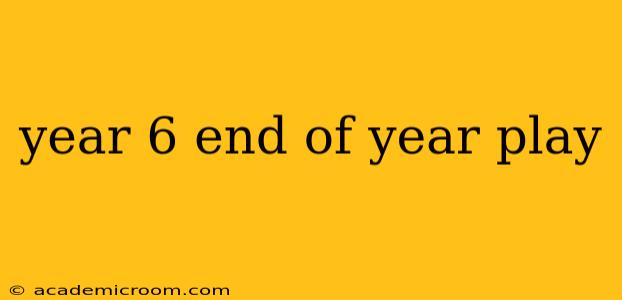Choosing the right end-of-year play for your Year 6 students is a significant undertaking. It needs to be engaging for both the performers and the audience, challenging yet achievable for the actors' skill levels, and ideally, memorable for everyone involved. This guide will explore various factors to consider when selecting and staging a successful Year 6 play. We'll delve into popular play types, offer practical tips for selection, and address common questions parents and teachers often have.
What are some popular types of Year 6 end-of-year plays?
Year 6 students are at a pivotal stage, bridging childhood and adolescence. Plays that reflect this transition, offering opportunities for complex character development and emotional expression, are often the most successful. Popular choices include:
-
Original Plays: Writing an original play, perhaps collaboratively with the students, fosters creativity and ownership. This approach allows you to tailor the themes and challenges directly to your students’ interests and abilities.
-
Classic Adaptations: Adapting classic fairy tales, myths, or novels (like abridged versions of Treasure Island or A Christmas Carol) offers familiar narratives, allowing students to focus on character interpretation and performance techniques.
-
Modern Plays with age-appropriate themes: Many contemporary playwrights create works specifically for young audiences. Look for pieces that explore themes of friendship, identity, growing up, and overcoming challenges – topics relatable to Year 6 students.
-
Musical Theatre: Incorporating music and song can elevate the performance and engage a broader range of student talents. Choose musicals with manageable musical demands, focusing on strong storytelling and age-appropriate lyrics.
What should I consider when choosing a play for my Year 6 class?
Several key factors should influence your decision:
-
Length and Complexity: Opt for a play with a manageable running time (around 45-60 minutes) and a script that's neither overly simple nor excessively challenging.
-
Number of Characters: Ensure the play has enough roles for all students who wish to participate, considering potential doubling up of characters if needed.
-
Set and Costume Requirements: Practicality is key. Choose a play with minimal set design requirements to avoid overwhelming the production team. Similarly, consider costumes that are easy to source or create.
-
Technical Elements: Evaluate the play’s demands on lighting, sound, and special effects. Keep it manageable to avoid overly stressing your technical crew.
-
Themes and Messages: Select a play with positive and uplifting themes that resonate with your students and their experiences.
What are some tips for staging a successful Year 6 end-of-year play?
-
Involve the students: Let them participate in the selection process, costume design, set construction, and other aspects of the production.
-
Start early: Allow ample time for rehearsals, costume creation, and set construction to alleviate last-minute stress.
-
Provide clear direction: Offer constructive feedback and support to help students develop their performance skills.
-
Embrace collaboration: Encourage teamwork and collaboration amongst students and staff.
-
Focus on fun: The goal is to create a memorable and enjoyable experience for everyone involved.
How long should a Year 6 play be?
Ideally, a Year 6 end-of-year play should last between 45-60 minutes. This timeframe keeps the audience engaged without becoming overly lengthy for young actors. Shorter plays can be extended with added scenes or interludes, while longer plays may need judicious editing.
What are some good resources for finding Year 6 plays?
Many online resources and theatrical publishers offer plays specifically written for young audiences. School drama suppliers also provide a range of options, often categorized by age group and skill level. Local libraries can be a great source of inspiration, too.
What if my students have limited acting experience?
If your students lack significant acting experience, choose a play with simpler dialogue and fewer complex characters. Focus on clear storytelling and provide ample rehearsal time to build confidence and skills. Prioritize collaborative learning and focus on teamwork to achieve a successful outcome. Remember, participation and enjoyment are key!
